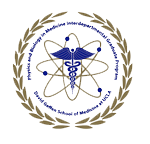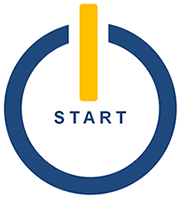


The Physics and Biology in Medicine PhD Program is an Interdepartmental Graduate Program (IDP) involving the Departments of Molecular and Medical Pharmacology, Radiology, and Radiation Oncology. Together with the evolution of scientific research, the training program changed over a number of years from a Masters' level Medical Physics degree in 1960, towards interdisciplinary directions and a full-fledged Interdepartmental Program (IDP) with Ph.D. focus in 1996, with four major tracks: (i) Molecular Imaging, (ii) Medical Imaging, (iii) Molecular and Cellular Oncology, and (iv) Therapeutic Medical Physics.
The Department of Molecular and Medical Pharmacology has assigned the Molecular Imaging Track of this IDP to the Crump Institute, which is also the home of most of the Molecular Imaging Track Faculty. The Crump Institute is therefore responsible for the track decision-making process of the admissions, curriculum and other IDP administrative committees.
The Molecular Imaging Track Faculty of the Crump Institute have backgrounds in physics, engineering, mathematics, chemistry, biology, biochemistry and medicine. This is the only graduate program in the David Geffen School of Medicine and the Division of Life Sciences Medicine and the Division of Life Sciences that categorically brings engineering, physical, biological and medical sciences into a biomedical sciences training program.
Each year, approximately 120 applicants from around the world with backgrounds in physics, engineering, mathematics, chemistry and biology apply for the 7-8 available positions, making the admissions process quite competitive. The first year students are funded mostly through an NIH training grant, but also through the IDP home departments, the UCLA Graduate Division and fellowships. There are currently 37 full time graduate students in the IDP program, 7 of which are in the Molecular Imaging track, and are doing their thesis research in one of the Crump faculty labs.
The T32 training grant has been funded for 32 years, initially through the National Cancer Institute and, since 2003, through the National Institute for Biomedical Imaging and Bioengineering. It was recently renewed (2011-2016) and continues to support various functions of the program.

The START (Scholars Trained in Advanced Radiochemistry Technologies) Course originates from a program [2009-2014] designed to transition exceptional scholars into the exciting fields of radiochemistry and molecular imaging. The initial support for this program was from the DOE office of Biological and Environmental Research, through a special "Integrated Radiochemistry Research Projects of Excellence" grant (DE-SC0001249, PI: Dr. Michael E. Phelps).
The START course, now offered approximately every other year, provides a foundation for training of graduate students and postdoctoral scholars at the interface of radiochemistry and engineering to help prepare them for careers in academia and industry in the areas of (1) PET radiochemistry, (2) instrumentation and technologies for radiochemistry, (3) PET tracer design and development. This collection of lectures addresses innovative research and technologies that have the potential for widespread impact in the fields of radiochemistry, PET imaging, drug development, and clinical medicine.
The START lectures are offered by the pioneering faculty members of the Crump Institute for Molecular Imaging and the Department of Molecular and Medical Pharmacology at UCLA. Lectures are supplemented with specialized workshops and seminars to provide more in-depth knowledge and hands-on experience in areas such as analytical instrumentation for radiochemistry, cutting-edge synthesis technologies, and novel methods towards radiofluorination.